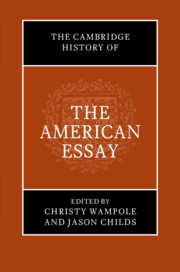Book contents
- The Cambridge History of the American Essay
- The Cambridge History of the American Essay
- Copyright page
- Contents
- Acknowledgments
- Notes on Contributors
- Introduction
- Part I The Emergence of the American Essay (1710–1865)
- Part II Voicing the American Experiment (1865–1945)
- Part III Postwar Essays and Essayism (1945–2000)
- Part IV Toward the Contemporary American Essay (2000–2020)
- 31 The American Essay Film: A Neglected Genre
- 32 Literary Theory, Criticism, and the Essay
- 33 Gender, Queerness, and the American Essay
- 34 Disability and the American Essay
- 35 The Radical Hybridity of the Lyric Essay
- 36 Writing Migration: Multiculturalism, Democracy, and the Essay Form
- 37 Latinx Culture and the Essay
- 38 Black Experience through the Essay
- 39 The Essay and the Anthropocene
- Recommendations for Further Reading
- Index
32 - Literary Theory, Criticism, and the Essay
from Part IV - Toward the Contemporary American Essay (2000–2020)
Published online by Cambridge University Press: 28 March 2024
- The Cambridge History of the American Essay
- The Cambridge History of the American Essay
- Copyright page
- Contents
- Acknowledgments
- Notes on Contributors
- Introduction
- Part I The Emergence of the American Essay (1710–1865)
- Part II Voicing the American Experiment (1865–1945)
- Part III Postwar Essays and Essayism (1945–2000)
- Part IV Toward the Contemporary American Essay (2000–2020)
- 31 The American Essay Film: A Neglected Genre
- 32 Literary Theory, Criticism, and the Essay
- 33 Gender, Queerness, and the American Essay
- 34 Disability and the American Essay
- 35 The Radical Hybridity of the Lyric Essay
- 36 Writing Migration: Multiculturalism, Democracy, and the Essay Form
- 37 Latinx Culture and the Essay
- 38 Black Experience through the Essay
- 39 The Essay and the Anthropocene
- Recommendations for Further Reading
- Index
Summary
This chapter takes stock of the various definitions and valuations the essay has accrued over the course of the history of American literary theory and criticism. Starting with the historical-materialist criticism of the Great Depression era and moving on to the New Criticism of the 1940s and ’50s, then delving into the myriad structuralisms and poststructuralisms of the Cold War and postcommunist eras, before concluding with contemporary critical trends, it tracks the discipline’s trajectory in the American context, all the while zeroing in on the essay’s shifting position therein. The chapter throws into relief the fundamental dialectic between hermetic formalism and committed social criticism that has shaped literary studies in the United States since its rise early in the twentieth century and teases out the way this perennial vacillation has rendered more or less appealing, and more or less useful, the essay as a form and object of analysis.
Keywords
- Type
- Chapter
- Information
- The Cambridge History of the American Essay , pp. 545 - 564Publisher: Cambridge University PressPrint publication year: 2023

